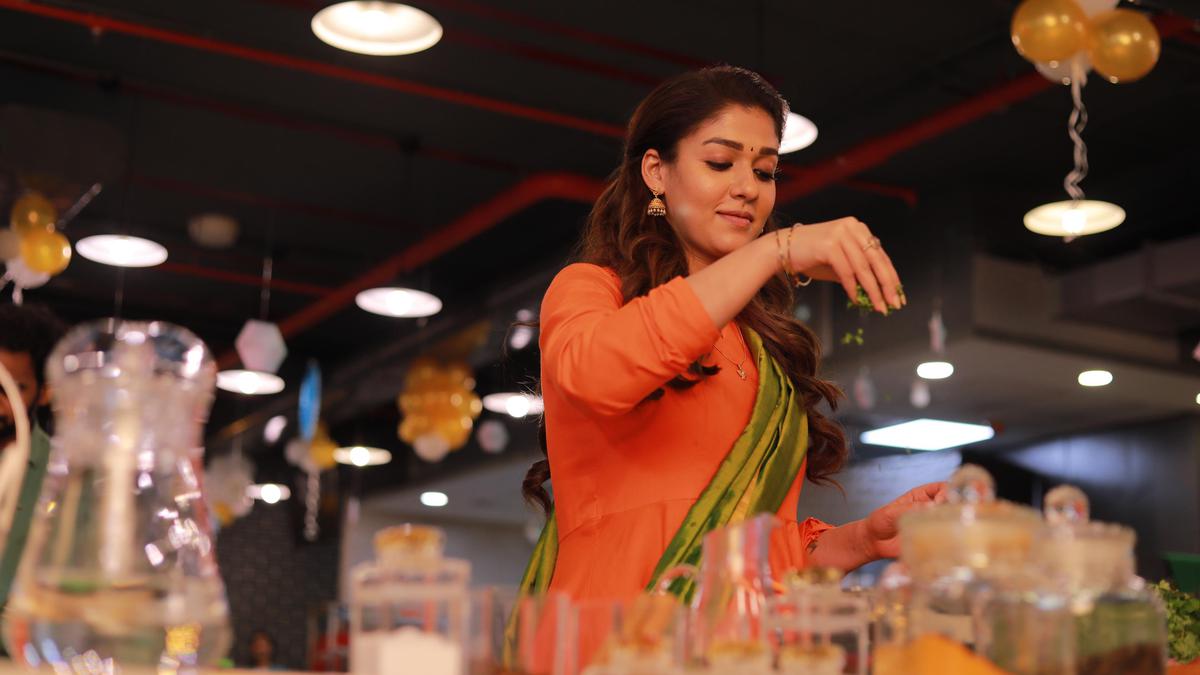
‘Annapoorani’ movie review: Nayanthara stars in a template underdog story that’s neither appetizing nor delectable
The Hindu
Nilesh Krishnaa’s ‘Annapoorani’, starring Nayanthara as a young woman with a dream to become a chef, has heartfelt ideas but the narration feels rushed and awfully convenient; it also very little of those mouth-watering visuals of food you’d expect in such a film
In one of the scenes of Annapoorani, the film’s titular protagonist, played by Nayanthara, prepares a Chettinad Chicken curry in her first-ever attempt to cook with meat, only to be told that it’s “good but not great.” Debutant Nilesh Krishnaa’s film is filled with many heartfelt, well-intentioned ideas that are neither cooked to our heart’s content nor have the consistency or presentation to see through the perfect meal it so desperately wishes to be. The ideas are appetising but the film is not delectable.
As a young child, when Annapoorani walks next to her dotting father, Rangarajan (Achyuth Kumar), the temple chef of the Srirangam Ranganathar temple carrying freshly made offerings to the lord, her eyes gleam with pride and adoration. It is with the same love that Rangarajan inadvertently feeds his daughter’s aspirations to become the best chef in the country, like the famous chef Anand Sundarajan (Sathyaraj). But even Rangarajan doesn’t fully understand the magic he sees in Annapoorani, this young girl from an orthodox Iyengar family who is swept away by the aroma of a fish fried on a hot pan in the roadside.
So when she grows up and shares her wish to join a culinary school to become a chef, Rangarajan forbids her to be in a place where meat is cooked. But what could she do if learning to chop a chicken is an unnegotiable prerequisite to becoming a successful chef? Annapoorani is forced to find love from within to fuel her dreams and make drastic decisions, and she has the support of her friends, which includes Farhan (Jai), who is secretly in love with her.
Right in the beginning, Nilesh makes it clear that he wishes to make a conventional film that sticks to the template, and that takes a certain conviction. So when you get an animation of a young girl climbing up Everest every time Annapoorani moves closer to her goals, the sheer cuteness of adding such an element makes you smile and you wonder about the possibilities that lay ahead. It is only unfortunate that everything following feels cluttered, rushed and awfully convenient. All the talks about how impossible it is for a cook to enter a five-star hotel’s kitchen become a joke when Annapoorani does it in just two scenes.
The storyline is too overfed and Nilesh finds himself having to stitch back one too many arcs to the main narrative. For instance, even retrospectively, the detail of Annapoorani being born with enhanced taste buds serves no purpose; couldn’t a less mythical, normal human being with a penchant for taste ever dream? There’s a lot of spoon-feeding that doesn’t help the film. For instance, if ascending a staircase isn’t metaphorical about rising to the top, a character has to spell it out through dialogue. Scene after scene, the dramatic background score tries to sell you the emotions, but nothing really sticks.
You feel a constant distance from the proceedings and even the high-pitched moments — like when Rangarajan figures out that Annapoorani has been lying to him — just don’t hit the mark you’d expect them to. The pre-intermission, for instance, has a ‘mass’ moment involving Annapoorani lashing out at her landlord, and it’s baffling how it all gets undone shortly later when she meets her again. Karthik Kumar is brought in as Anand’s son and a menace to Annapoorani to spice things up, but he becomes a caricature at best.
It’s appalling how random ideas are forced into the narrative in the final stretch of the film; Annapoorani speaks about relevant gender issues faced by women in entering the culinary business but the film does very little to discuss these aspects. It’s disappointing considering the film touches upon many of these aspects but refuses to dig any deeper. For instance, Annapoorani chooses to eat meat, yes, but why doesn’t she rise to question why there isn’t an alternative in place for chefs to cook non-vegetarian food without having to eat it? Where else would you question this, if not in a film that speaks about how taste isn’t the only sense that cooking requires? Annapoorani is a film that neither digs into the cut-throat realities of the food and beverage industry nor makes up for it with delicious visuals of food, which is another concern on its own.

Music composer Pritam Chakraborty files police complaint after office boy allegedly steals ₹ 40 lakh
Theft of Rs 40 lakh from Pritam Chakraborty's Mumbai office, police investigating missing money incident involving employee.












